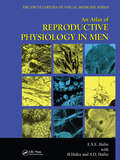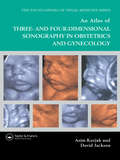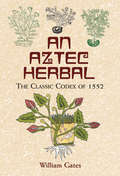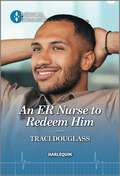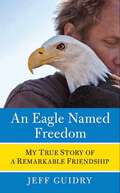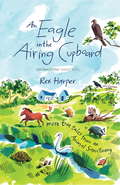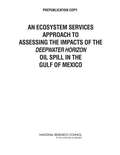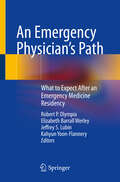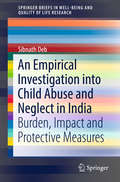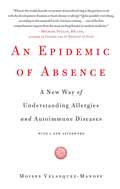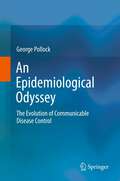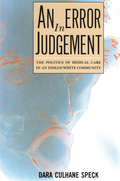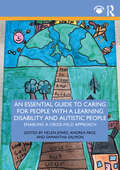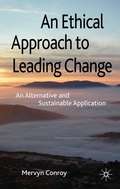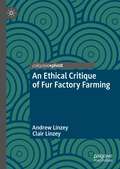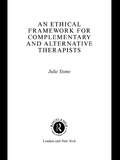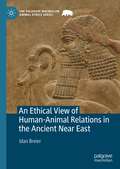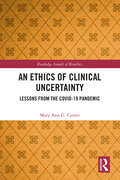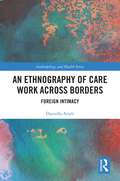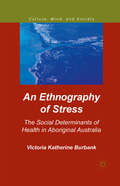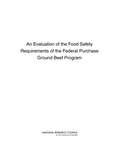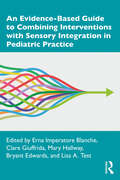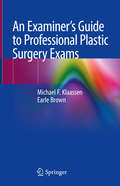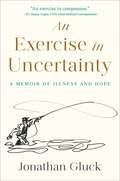- Table View
- List View
An Atlas of Reproductive Physiology in Men
by B. Hafez S.E. Hafez Saad Dean HafezMeeting the needs of professionals in this growing specialty, Atlas of Reproductive Physiology in Men summarizes some of the latest research in the field. Packed with tables, color illustrations, and photographs, the book covers laboratory techniques and morphological, anatomical, biochemical, immunological, hereditary, and microbiological parameters and their clinical applications. A comprehensive and well-referenced resource, the atlas bridges the gap between basic and clinical science.
An Atlas of Three- and Four-Dimensional Sonography in Obstetrics and Gynecology
by David JacksonAs the use of three-dimensional ultrasound in clinical practice increases, the need for a reference covering this and other emerging technologies also increases. The book presents three-dimensional ultrasound images in full colour accompanied by extensive captions and expert textual commentary. It provides authoritative coverage of the latest devel
An Aztec Herbal: The Classic Codex of 1552 (Native American)
by William GatesOriginally written in the Aztec language, this 16th-century codex was the first herbal and medical text compiled in the New World. It contains ancient remedies for myriad ailments -- boils, hair loss, cataracts, insomnia hiccoughs, and gout, to name a few. Analytical Index to Plants. New Introduction. Over 180 black-and-white and 38 color illustrations.
An ER Nurse to Redeem Him (Wyckford General Hospital #2)
by Traci DouglassIn the latest installment of Traci Douglass&’s Wyckford General Hospital quartet, discover what happens when attending a charity event together ends in the nurse and the EMT sharing an earth-shattering kiss! A REASON TO STAY? Flying EMT Tate is the new guy in town, but he won&’t be staying long. Grief and guilt keep this ex-military medic on the move. Inadvertently becoming ER nurse Madi&’s date to a charity auction should change nothing… But that&’s before Tate and the usually cautious-in-love Madi share a toe-curling kiss! Is their unexpected connection the key to redeeming this haunted hero?From Harlequin Medical: Life and love in the world of modern medicine.Wyckford General Hospital Book 1: Single Dad's Unexpected ReunionBook 2: An ER Nurse to Redeem HimBook 3: Her Forbidden Firefighter
An Eagle Named Freedom: My True Story of a Remarkable Friendship
by Jeff Guidry“A hauntingly beautiful story of rescue and rehabilitation….[A] gorgeous tale of redemption.”—Susan Richards, New York Times bestselling author of Chosen by a Horse“I could not put this book down.”—Stacey O'Brien, New York Times bestselling author of Wesley the OwlFrom the moment Jeff Guidry saw the emaciated baby eagle with broken wings, his life was changed. For weeks he and the staff at Sarvey Wildlife Care Center tended to the grievously injured bird. Miraculously, she recovered, and Jeff, a center volunteer, became her devoted caretaker.Though Freedom would never fly, she had Jeff as her wings. And after Jeff was diagnosed with stage 3 non-Hodgkin's lymphoma in 2000, Freedom returned his gift. Between sessions of debilitating chemotherapy, Jeff went back to Sarvey and began taking Freedom for walks that soothed his spirit and gave him the strength to fight. A tender tale of hope, love, trust, and life, this moving true story is an affirmation of the spiritual connection that humans and animals share.
An Eagle in the Airing Cupboard
by Rex HarperAN EAGLE IN THE AIRING CUPBOARD picks up where Rex Harpers first book, AN OTTER ON THE AGA, left off. It follows the fortunes of the Cornish RSPCA centre through one of its most testing twelve months. Once more it is a mixture of funny, touching and sometimes moving animal stories. And once more it features a cast of unforgettable characters, like Alfie and Blue, two hideously mistreated greyhounds that are rehabilitated at the farm, as well as the return of old favourites from Rex's first book, including his loyal dog Moss. Throughout, Rex evokes the sights, smells, sounds and spirit of the Cornish countryside in all its timeless beauty. He also encounters sickening cases of animal cruelty committed by humans unfit to care for any living thing. Funny, warm and evocative, it is a book that is, once more, set to melt and occasionally break the hearts of animal lovers everywhere.
An Ecosystem Services Approach to Assessing the Impacts of the Deepwater Horizon Oil Spill in the Gulf of Mexico
by National Research Council Ocean Studies Board Division on Earth and Life Studies Committee on the Effects of the Deepwater Horizon Mississippi Canyon-252 Oil Spill on Ecosystem Services in the Gulf of MexicoAs the Gulf of Mexico recovers from the Deepwater Horizon oil spill, natural resource managers face the challenge of understanding the impacts of the spill and setting priorities for restoration work. The full value of losses resulting from the spill cannot be captured, however, without consideration of changes in ecosystem services--the benefits delivered to society through natural processes. An Ecosystem Services Approach to Assessing the Impacts of the Deepwater Horizon Oil Spill in the Gulf of Mexico discusses the benefits and challenges associated with using an ecosystem services approach to damage assessment, describing potential impacts of response technologies, exploring the role of resilience, and offering suggestions for areas of future research. This report illustrates how this approach might be applied to coastal wetlands, fisheries, marine mammals, and the deep sea -- each of which provide key ecosystem services in the Gulf -- and identifies substantial differences among these case studies. The report also discusses the suite of technologies used in the spill response, including burning, skimming, and chemical dispersants, and their possible long-term impacts on ecosystem services.
An Emergency Physician’s Path: What to Expect After an Emergency Medicine Residency
by Kahyun Yoon-Flannery Robert P. Olympia Jeffrey S. Lubin Elizabeth Barrall WerleyA career in emergency medicine can be truly rewarding, despite the long hours and adverse conditions. The decision to embark on this journey typically starts during medical school, usually with the allure of resuscitations and life-saving procedures performed in the fast-paced environment of the emergency department. During an emergency medicine residency, the young physician is faced with career decisions that may involve working in a community or academic emergency department setting, or pursuing specialization through fellowship. Following residency and fellowship training, the emergency physician may decide to purely work clinically in an emergency department, or combine clinical responsibilities with administrative, education or research pursuits. This unique text provides medical students, residents, fellows and attending physicians with a comprehensive guide to be successful in a career in emergency medicine. Sections include the history of emergencymedicine, choosing a career in emergency medicine from a medical student’s point of view, pursuing fellowship and additional training, community and academic careers in emergency medicine, career options in emergency medicine, critical skills in emergency medicine, research/scholarship, being a teacher, and carving a path in emergency medicine. All chapters are written by experts in the field, representing emergency departments throughout North America.
An Empirical Investigation into Child Abuse and Neglect in India: Burden, Impact And Protective Measures (SpringerBriefs in Well-Being and Quality of Life Research)
by Sibnath DebThis book provides a comprehensive overview of child abuse and neglect globally in general terms and with empirical evidence from Puducherry, India. The study unearths the reality concerning child safety and raises a number of questions about child safety measures at the institutional and family levels. It recommends evidence-based and culture-specific preventive measures for child protection. The empirical evidence presented here provides important and useful information to school administrators on the issues of child abuse and neglect, for them to take evidence-based protective measures both at school and at home. For cross-cultural comparison, the findings are of interest to international scholars and academics. This work is useful for policy makers, educators, NGO personnel, child rights activists and opinion leaders in government departments dealing with children, and for researchers in the fields of psychology, social work, nursing, pediatric, forensic medicine, and public health.
An Epidemic of Absence
by Moises Velasquez-ManoffA brilliant, cutting-edge exploration of the dramatic rise of allergic and autoimmune diseases and the controversial, potentially groundbreaking therapies that scientists are developing to correct these disorders Whether it is asthma, food or pollen allergies, type-1 diabetes, lupus, multiple sclerosis, or Crohn's disease, everyone knows someone who suffers from an allergic or autoimmune disorder. And if it appears that the prevalence of these maladies has increased recently, that's because it has--to levels never before seen in human history. These days no fewer than one in five--and likely more--Americans suffers from one of these ailments. We seem newly, and bafflingly, vulnerable to immune system malfunction. Why? Science writer Moises Velasquez-Manoff explains the latest thinking about this problem and explores the remarkable new treatments in the works. In the past 150 years, improved sanitation, water treatment, and the advent of vaccines and antibiotics have saved countless lives, nearly eradicating diseases that had plagued humanity for millennia. But now, a growing body of evidence suggests that the very steps we took to combat infections also eliminated organisms that kept our bodies in balance. The idea that we have systematically cleaned ourselves to illness challenges deeply entrenched notions about the value of societal hygiene and the harmful nature of microbes. Yet scientists investigating the rampant immune dysfunction in the developed world have inevitably arrived at this conclusion. To address this global "epidemic of absence," they must restore the human ecosystem. This groundbreaking book explores the promising but controversial "worm therapy"--deliberate infection with parasitic worms--in development to treat autoimmune disease. It explains why farmers' children so rarely get hay fever, why allergy is less prevalent in former Eastern Bloc countries, and how one cancer-causing bacterium may be good for us. It probes the link between autism and a dysfunctional immune system. It investigates the newly apparent fetal origins of allergic disease--that a mother's inflammatory response imprints on her unborn child, tipping the scales toward allergy. In the future, preventive treatment--something as simple as a probiotic--will necessarily begin before birth. An Epidemic of Absence asks what will happen in developing countries, which, as they become more affluent, have already seen an uptick in allergic disease: Will India end up more allergic than Europe? Velasquez-Manoff also details a controversial underground movement that has coalesced around the treatment of immune-mediated disorders with parasites. Against much of his better judgment, he joins these do-it-yourselfers and reports his surprising results. An Epidemic of Absence considers the critical immune stimuli we inadvertently lost as we modernized, and the modern ills we may be able to correct by restoring them. At stake is nothing less than our health, and that of our loved ones. Researchers, meanwhile, have the good fortune of living through a paradigm shift, one of those occasional moments in the progress of science when a radically new way of thinking emerges, shakes things up, and suggests new avenues of treatment. You'll discover that you're not you at all, but a bustling collection of organisms, an ecosystem whose preservation and integrity require the utmost attention and care.
An Epidemic of Absence: A New Way of Understanding Allergies and Autoimmune Diseases
by Moises Velasquez-ManoffA brilliant, cutting-edge exploration of the dramatic rise of allergic and autoimmune diseases and the controversial, potentially groundbreaking therapies that scientists are developing to correct these disorders Whether it is asthma, food or pollen allergies, type-1 diabetes, lupus, multiple sclerosis, or Crohn's disease, everyone knows someone who suffers from an allergic or autoimmune disorder. And if it appears that the prevalence of these maladies has increased recently, that's because it has--to levels never before seen in human history. These days no fewer than one in five--and likely more--Americans suffers from one of these ailments. We seem newly, and bafflingly, vulnerable to immune system malfunction. Why? Science writer Moises Velasquez-Manoff explains the latest thinking about this problem and explores the remarkable new treatments in the works. In the past 150 years, improved sanitation, water treatment, and the advent of vaccines and antibiotics have saved countless lives, nearly eradicating diseases that had plagued humanity for millennia. But now, a growing body of evidence suggests that the very steps we took to combat infections also eliminated organisms that kept our bodies in balance. The idea that we have systematically cleaned ourselves to illness challenges deeply entrenched notions about the value of societal hygiene and the harmful nature of microbes. Yet scientists investigating the rampant immune dysfunction in the developed world have inevitably arrived at this conclusion. To address this global "epidemic of absence," they must restore the human ecosystem. This groundbreaking book explores the promising but controversial "worm therapy"--deliberate infection with parasitic worms--in development to treat autoimmune disease. It explains why farmers' children so rarely get hay fever, why allergy is less prevalent in former Eastern Bloc countries, and how one cancer-causing bacterium may be good for us. It probes the link between autism and a dysfunctional immune system. It investigates the newly apparent fetal origins of allergic disease--that a mother's inflammatory response imprints on her unborn child, tipping the scales toward allergy. In the future, preventive treatment--something as simple as a probiotic--will necessarily begin before birth. An Epidemic of Absence asks what will happen in developing countries, which, as they become more affluent, have already seen an uptick in allergic disease: Will India end up more allergic than Europe? Velasquez-Manoff also details a controversial underground movement that has coalesced around the treatment of immune-mediated disorders with parasites. Against much of his better judgment, he joins these do-it-yourselfers and reports his surprising results. An Epidemic of Absence considers the critical immune stimuli we inadvertently lost as we modernized, and the modern ills we may be able to correct by restoring them. At stake is nothing less than our health, and that of our loved ones. Researchers, meanwhile, have the good fortune of living through a paradigm shift, one of those occasional moments in the progress of science when a radically new way of thinking emerges, shakes things up, and suggests new avenues of treatment. You'll discover that you're not you at all, but a bustling collection of organisms, an ecosystem whose preservation and integrity require the utmost attention and care.
An Epidemiological Odyssey: The Evolution of Communicable Disease Control
by George PollockThis book attempts to set communicable diseases and the efforts to control them in a social and historical context. The primary focus is on England with its particular history, culture and traditions. The timescale covered is extensive and ambitious, and the many strands that came together in the nineteenth century to form the English public health service are clearly highlighted. However the main emphasis of the narrative is on developments from the Second World War onwards, in some of which the author has had a degree of personal involvement as a schoolchild, medical student, hospital doctor, Army doctor and public health physician. The work as a whole reveals the persisting nature of communicable diseases throughout history and strongly argues that, although the relevant importance of individual infections may vary over time, man's struggle against the microbiological world can never be relaxed. How England has been affected is described in detail and evidence is put forward to suggest that complacency (or at least misjudgement) concerning the ever-present risks of emerging and re-emerging infections, led unwisely to the dismantling in 1974 of its established arrangements for their control, along with the subsequent need, frequently repeated, to create new structures for this purpose. This book will appeal strongly to all students and practitioners of public health along with those interested in English social history.
An Error in Judgement: The Politics of Medical Care in an Indian/White Community
by Dara Culhane SpeckON JANUARY 22, 1979, an eleven-year-old Native girl died of a ruptured appendix in an Alert Bay, B.C. hospital. The events that followed are chronicled here by Dara Culhane Speck, a member by marriage of the Nimpkish Indian Band in Alert Bay. She has relied mainly on interviews, anecdotes, and public records to describe how this small, isolated Native community took on the local hospital, the College of Physicians and Surgeons, provincial and federal ministries of health, and national media, because their private tragedy held implications that reached far beyond one child, one physician, one town, and even one century.
An Essential Guide to Caring for People With a Learning Disability and Autistic People: Enabling a Cross-Field Approach.?
by Andrea Page Helen Jones Samantha SalmonThis essential text presents the core information that all nursing students and apprentices along with other key health and social care professions, regardless of field, need to know about caring for people with a learning disability and autism. It outlines some of the key challenges faced by people with a learning disability and autism, and ways in which good care can improve their quality of life. People with a learning disability and autism are more likely to need support with aspects of everyday life, be marginalised within society, including within health and social care, and die younger than the rest of the population. They are also more likely to have additional communication needs, sensory processing difficulties and require significant support to access healthcare as well as other opportunities across the course of their lives.This innovative text highlights the core knowledge that all health and social care professionals need and emphasises the benefits of learning across different fields of practice. It presents information about common conditions, key skills, and where a standard approach may need to be changed when caring for a person with a learning disability and autistic people. It demystifies key issues and commonly misunderstood concepts and topics including distressed behaviours, consent and reasonable adjustments. The book also focuses on addressing health inequalities, improving communication, understanding mental capacity and presents case studies throughout to illustrate how care can and should be delivered.Written for all who aspire to understand the needs of these individuals and to deliver care as effectively as possible, this collaborative text brings together the voices of services users and their families and carers, with those of nurses, other health professionals, lecturers, and nursing students and apprentices.
An Ethical Approach to Leading Change
by Mervyn ConroyMacIntyre's narrative based virtue ethics have for the first time in this book been applied to an organization undergoing change driven by market forces and a society that wants more for less with scant regard for the means by which that is achieved. The practical potential of these insights is explored in the case study that runs through the book.
An Ethical Critique of Fur Factory Farming (The Palgrave Macmillan Animal Ethics Series)
by Andrew Linzey Clair LinzeyThe fur trade is a multi-million-dollar industry. It is estimated that over 100 million animals are killed in fur farms worldwide annually. This book provides an in-depth analysis of the state of fur factory farming worldwide, and an ethical critique of the main arguments propounded by the fur industry. Consideration is also given to an attempt to justify fur farming through the concept of “Welfur." Andrew Linzey and Clair Linzey argue that from any ethical perspective, fur factory farming fails basic moral tests.
An Ethical Framework for Complementary and Alternative Therapists
by Julie StoneAs growing numbers of patients turn to complementary and alternative medicine (CAM), the focus of attention has largely been on whether these therapies work and whether they are safe. These questions are central to further integration of CAM with orthodox medicine. But in the absence of formal regulation, it is equally critical to consider the ethical dimensions of the CAM therapeutic encounter.In this book, Julie Stone demonstrates that ethical issues are no less relevant to CAM therapists than they are to doctors or any other group of health professionals. She provides CAM therapists with a detailed framework of the specific ethical issues which affect CAM practice to help practitioners think constructively about how ethics underpin their therapeutic work.An Ethical Framework for Complementary and Alternative Therapists encourages critical and reflective practice, suggests practical problems to common problems, includes illustrative scenarios of ethical dilemmas faced by therapists and summarises key points. This timely book offers a comprehensive guide to this important area. Its challenging conclusions are as relevant to experienced practitioners as to students and newly qualified therapists. This book will also interest policy makers and professional bodies interested in strengthening and enhancing CAM's potential.
An Ethical View of Human-Animal Relations in the Ancient Near East (The Palgrave Macmillan Animal Ethics Series)
by Idan BreierExploring the earliest literary evidence for human-animal relations, this volume presents and analyzes biblical and Mesopotamian (Sumerian, Assyrian, and Babylonian) sources from the third millennium BCE through to the consolidation of the biblical literature in the first millennium BCE. Key Features:Provides the first comprehensive study of these texts from an ethical perspective.Examines proverbs, popular aphorisms, myths, epic literature, wisdom literature, historiography, prophecy, and law codes.Applies methodology from current contemporary biblical and ancient Near Eastern scholarship and human-animal ethics, thereby raising new questions that lead to fresh insights.An Ethical View of Human Animal-Relations in the Ancient Near East is essential reading for scholars and graduate students of animal ethics, applied ethics and biblical studies.
An Ethics of Clinical Uncertainty: Lessons from the COVID-19 Pandemic (ISSN)
by Mary Ann CutterThis book explores the ethical implications of managing uncertainty in clinical decision-making during the COVID-19 pandemic. It develops an ethics of clinical uncertainty that brings together insights from the clinical and biomedical ethical literatures.The book sets out to recognize the central role uncertainty plays in clinical decision-making and to acknowledge the different levels, kinds, and dimensions of clinical uncertainty. It also aims to aid clinicians and patients in managing clinical uncertainty and to recognize the ethical duty they have to manage clinical uncertainty. The book addresses four ethical duties related to clinical uncertainty: (1) to advance the welfare of those in clinical medicine, (2) to respect the rights of those in clinical medicine, (3) to promote just access to health care, and (4) to care for one another in clinical medicine. These duties took on select urgency during the COVID-19 pandemic because clinical risk assessments about COVID-19 were limited, we were asked to give informed consent in the context of limited and changing knowledge, the pandemic unearthed myriad problems about the distribution of health care, and the pandemic raised questions about how we care for each other in medicine.An Ethics of Clinical Uncertainty will appeal to scholars, advanced students, and medical professionals working in philosophy of medicine, biomedical ethics, clinical medicine, nursing, public health care, and gerontology.
An Ethnography of Care Work Across Borders: Foreign Intimacy (Anthropology and Health)
by Daniella ArieliThis ground-breaking ethnography illuminates the theory and practice of ‘aging in place’ by examining the relationships between migrant live-in care-workers of older people in Israel, and their local employers and family members. Daniella Arieli begins her investigation with a discussion of her own experiences of employing a care worker from overseas for her mother and sets the book in its interdisciplinary context, while looking at how best to promote the health and wellbeing of both family members and carers. The two central sections of the book focus on interviews and discussions with care workers and family members respectively, with topics such as violence and abuse, trust and suspicion, transnational familial relationships, legal difficulties, personal transformations and cultural differences discussed. This book is an invaluable contribution to the literature on transnational care work and the movement of healthcare practitioners around the world. It is of interest to advanced students and scholars in the fields of nursing, anthropology, sociology, social work, geography and gerontology.
An Ethnography of Stress: The Social Determinants of Health in Aboriginal Australia (Culture, Mind, and Society)
by Victoria Katherine BurbankThis book examines the global issue of health inequality through an in-depth look at a remote Australian Aboriginal community characterized by premature morbidity and mortality.
An Evaluation of the Food Safety Requirements of the Federal Purchase Ground Beef Program
by National Research Council of the National AcademiesTo ensure the safety of food distributed through the National School Lunch Program, food banks, and other federal food and nutrition programs, the United States Department of Agriculture has established food safety and quality requirements for the ground beef it purchases. This National Research Council book reviews the scientific basis of the Department's ground beef safety standards, evaluates how the standards compare to those used by large retail and commercial food service purchasers of ground beef, and looks at ways to establish periodic evaluations of the Federal Purchase Ground Beef Program. The book finds that although the safety requirements could be strengthened using scientific concepts, the prevention of future outbreaks of foodborne disease will depend on eliminating contamination during production and ensuring meat is properly cooked before it is served.
An Evidence-Based Guide to Combining Interventions with Sensory Integration in Pediatric Practice
by Erna Imperatore Blanche Clare Giuffrida Mary Hallway Bryant Edwards Lisa A. TestThis book offers practical ideas on the combination of sensory integration theory principles with other evidence-based approaches in the evaluation and treatment of multifaceted issues in children with disabilities. Using the ICF Model, a Clinical Reasoning Model, and featuring numerous case studies, the opening chapters focus on the evidence for combining intervention approaches with diagnoses most often encountered in clinical practice. The latter half of the book covers the delivery of services using blended intervention approaches in different settings, such as the school, the hospital, and in nature. Featured are existing community programs illustrating the combination of approaches in practice. Appendices include reproducible resources, a guide to assessments, and approaches. The text will guide occupational therapists and other health professionals working with children and adolescents across a variety of settings in using clinical reasoning skills in a systematic manner that will lead to better interventions.
An Examiner’s Guide to Professional Plastic Surgery Exams
by Michael F. Klaassen Earle BrownThis book serves as a guide for senior trainees preparing for their final professional exams at the end of at least 4 – 5 years of advanced training in an approved plastic and reconstructive surgery training programme. These exams are extremely challenging and difficult to pass, and a knowledge of plastic surgery alone is not enough. Judgement, discipline and the ability to handle the pressure of the exam interactions are key. The book dissects each segment of the exam and presents the common clinical, anatomical and pathological cases that candidates are likely to encounter.
An Exercise in Uncertainty: A Memoir of Illness and Hope
by Jonathan GluckIn this thought-provoking memoir, an award-winning journalist explores the chaos, doubt, and search for meaning that come with staying one step ahead of cancer for decades.&“An Exercise in Uncertainty has a powerful and restorative story to tell us. Jonathan Gluck&’s life of illness and survival is a vital primer for us all—a lesson in how to face and comprehend two of the basic facts that render us human: We die, but much more important, we live.&”—Richard Ford &“Navigates the dire straits of mortality with eloquence, wit, and intelligence.&”—Susan OrleanAt age thirty-eight, Jonathan Gluck, a new father with a promising journalism career, was shocked to learn he had multiple myeloma, a rare, incurable blood cancer. He was told he had eighteen months to live.That was more than twenty years ago.Gluck isn&’t just something of a medical miracle. He&’s also part of a growing population. Thanks to revolutionary medical advances, many cancers and other serious illnesses are no longer death sentences but chronic diseases people can often live with for years. While doctors continue to look for &“magic bullet&” cures, they can now extend patients&’ lives by slowing the progression of their diseases one treatment at a time. The result is a strange, new no-man&’s-land between being sick and being well where Gluck and millions of others reside.In An Exercise in Uncertainty, Gluck maps this previously uncharted territory. Among the many vexing side effects of chronic illness he explores is uncertainty—never knowing from one day to the next how one&’s illness might change them physically, emotionally, spiritually. When you have an incurable disease, how do you cope with knowing that even when you&’re in remission, it will eventually return? How do you live with the anxiety, the fear, the near-constant awareness of your mortality? For Gluck, one surprising answer is fly-fishing. If you&’re looking for peace in your own sea of uncertainty, it might be something else.As Gluck will be the first to say, cancer has absolutely nothing good to offer, but almost dying has taught him valuable lessons about how to live.
